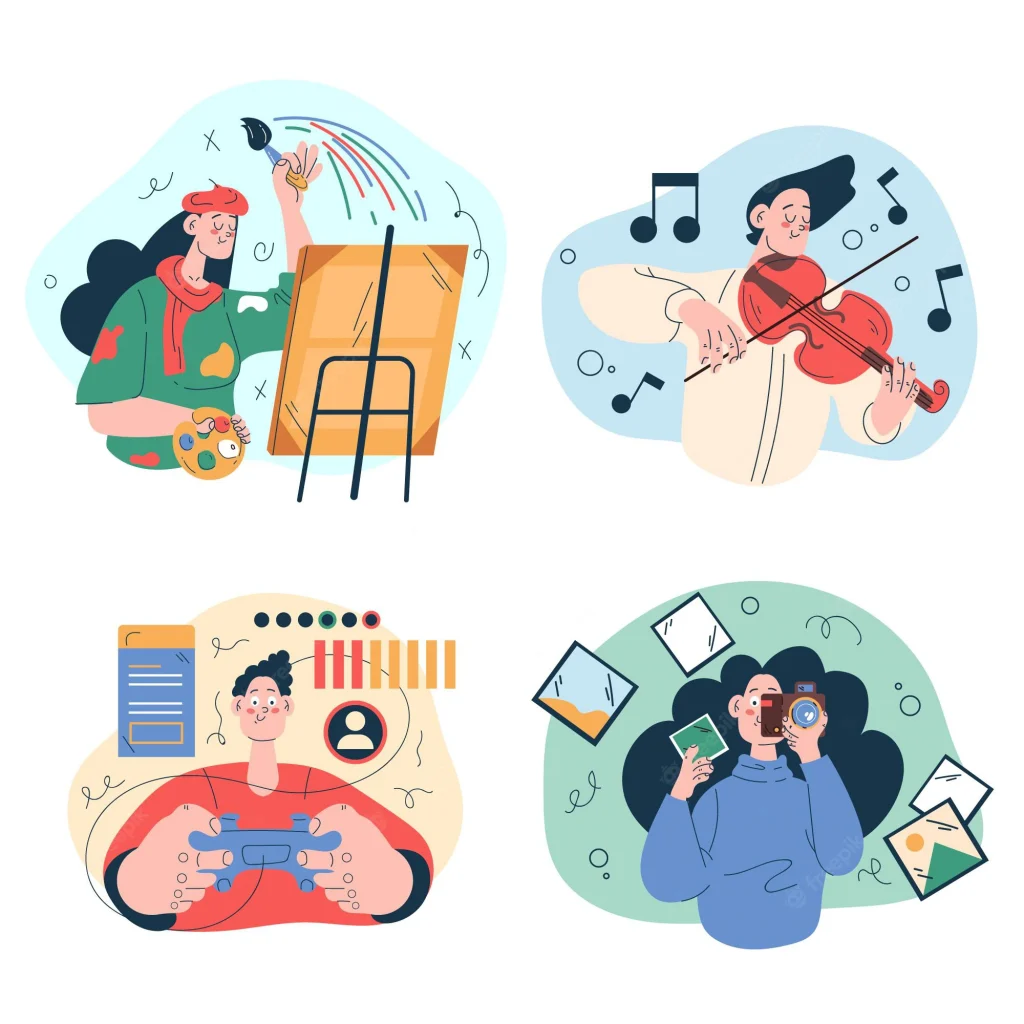By Chelsea Awang, a student tutor
There is a sinking feeling familiar to me on the Sunday evenings of unproductive weeks. It is the feeling that comes after another week passes without me drawing or writing anything. As a busy college student juggling classes, clubs, work-study, and other student activities, I have little time to engage in beloved hobbies, and these resulting unproductive weeks pile up on each other.
In the years before enrolling in University, my hobbies came naturally as a response to boredom or free time. I would spend a lot of time on my hobbies, and I got better at each one quickly. It took me a single semester in University to realize that I wouldn’t be able to take my hobbies as seriously as I used to before. This, of course, upset me and I knew I needed a solution. I had to change my mindset toward doing these hobbies. If I wanted to keep doing these things I loved while studying, I needed to be intentional with it. If I kept a casual relationship with skills that took me years to learn, I would eventually lose them
Hobbies are time-taxing by nature–mostly existing to relieve boredom for a prolonged period. An average-sized portrait that I draw can take half a day to complete and casual writing can stretch out for hours. This does not mean that a student cannot participate in their favourite activities from time to time; they only need to manage their time well. Human beings in different walks of life have more time than they think they do. This extra time is often wasted, unconsciously, on comparably less important activities. Depending on how important your hobbies are to you, you can make time, to the disadvantage of another activity, for your hobbies.
Tips and Tricks
Firstly
Before beginning this journey, one must be absolutely sure of themself. There are so many things for a student to do in such little time and unless you have passion and discipline, any tips and tricks might not work. It is okay sometimes to give up on or get tired of certain hobbies and, when that happens, you should allow yourself to drop them.
- Time hunting
Time for classes and studying is paramount for students and you should not give up on any of this time to make space for hobbies. To create time, make a semi-concise list of your daily activities and try to include little things like walking to and from class or taking a shower. When you have this list, you can begin to strike out certain activities, limiting them or shifting them to create time. For example, I decided, due to the time, it takes me to go home after morning classes, to spend my entire day at school and utilize the spare time on something more useful. You can also try to plan out your weekends to utilize the unused time that those days often have.
- Schedules, planners, sticky notes, and colored pens for the win
Creating a schedule is useful and a lot of fun. Using the list you created when ‘hunting for time’, create a schedule that accounts for time spent in and off class. Be creative and fun with it, make it nice to look at, legible, and easy to follow. Your schedule should mention how much time you spend on each activity and you should strive to stick to it as strictly as possible.
- Space and aesthetics
One issue when pursuing hobbies as a University student is the motivation to actually DO whatever it is even when you have the time. A good source of motivation, when studying and hobbying is being in a nice environment and in a good mood. Your environment doesn’t need to be fancy; declutter your hobby space, keep it airy and clean, and decorate it if you like. If your hobby is an outdoor activity, you can put some effort into a nice outfit or equipment. To improve your mood, rest before working on your hobby and eat good food.
- Hush money
Another solution to the problem of motivation is to set ultimatums for yourself. This is a behaviour that you can use to get yourself to do something you don’t want to do. The practice is simple; give yourself a goal and a reward for the completion of that goal. A good reward I use for myself is a snack. For example, I promise myself an ice cream if I complete a chapter of writing. Keep your rewards small and doable to avoid indulging yourself too often.
- Mono-tasking
Mono-tasking is an important skill in and out of the classroom. In our busy world, where multi-tasking is valued, we never concentrate properly on anything at a time, leading to the malabsorption of information. When doing things important to you, like engaging in hobbies or doing an assignment, it is important to cut off all distractions and focus solely on the task at hand. This can be especially rewarding during creative hobbies where your full concentration will result in a better-finished product in a shorter overall time
- Take a break
As with most things, over-exertion can lead to exhaustion. In my journey to continue regularly engaging in my hobbies, I found myself drawing or writing for hours on end, even when I was tired. The resulting fatigue led me to go even more days without touching a pencil. The solution to this is to simply take it easy. The former tips I gave in this list will ensure you participate in your beloved hobbies, so try not to feel guilty when taking a break.



